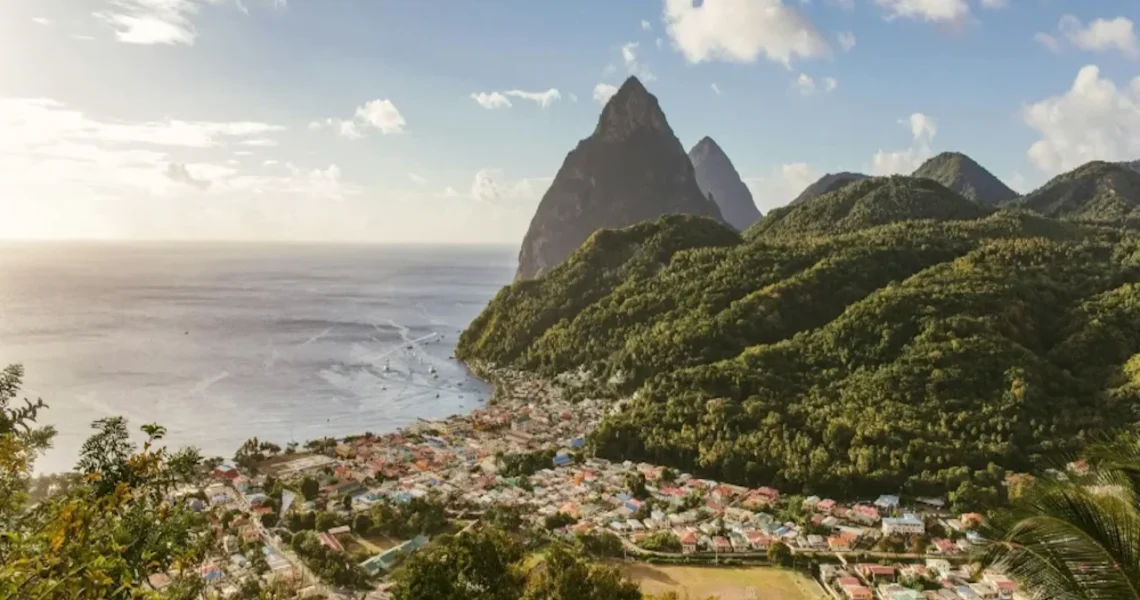St. Lucia Safety: 2025 Travel Advisory Guide
Saint Lucia, often hailed as a picturesque jewel of the West Indies, is a captivating island nation nestled in the eastern Caribbean Sea.
Its allure lies in its stunning natural landscapes, vibrant cultural tapestry, and the genuine warmth of its hospitality. Visitors are drawn to its dramatic volcanic peaks, lush rainforests, cascading waterfalls, and the iconic twin Pitons. However, beneath this idyllic facade, potential travelers and those considering relocation often ponder a crucial question: Is it truly safe to travel or live in St. Lucia? Understanding the nuances of safety is essential for a worry-free experience.
As of the latest advisory issued by the U.S. Department of State, Saint Lucia is classified under Level 1: Exercise Normal Precautions. This designation indicates that the U.S. government considers St. Lucia to be among the safer international destinations. This positive assessment should reassure a wide range of travelers, whether they plan to visit solo, embark on a family vacation, or explore the island with friends. While no destination is entirely without risk, a Level 1 advisory suggests that standard common-sense safety measures are generally sufficient for a safe visit.
Saint Lucia in 2025: An Overview of a Popular Destination
Despite its relatively modest size, Saint Lucia consistently attracts a significant number of visitors each year, typically welcoming approximately 400,000 to 500,000 individuals. This impressive figure comprises both stay-over tourists, who spend nights on the island, and a substantial contingent of cruise ship passengers, who enjoy shorter, day-long visits. The island’s enduring popularity is, of course, well-founded.
Saint Lucia boasts a sublime and unique landscape, dramatically shaped by ancient volcanic activity. This geological history has endowed the island with towering peaks, dense tropical rainforests, refreshing waterfalls, and the globally recognized, majestic twin volcanic spires known as the Pitons, which are a UNESCO World Heritage Site. The capital city, Castries, serves as a vibrant hub and a favored destination for many tourists, offering bustling markets, historical sites, and a lively port. Conversely, the island’s more rural areas provide a quieter, more intimate glimpse into local life, allowing visitors to experience the authentic pace and charm of the community.
English stands as the official language of Saint Lucia, making communication relatively straightforward for many international visitors. The local currency is the Eastern Caribbean dollar (XCD), which is pegged to the U.S. dollar, providing exchange rate stability. Politically, Saint Lucia operates as a parliamentary democracy within the Commonwealth, having gained full independence from the United Kingdom in 1979. Since achieving self-governance, the nation has steadily developed its distinct national identity and a rich cultural heritage that permeates all aspects of life.
The island truly comes alive with a harmonious blend of music, vibrant colors, and rich culinary traditions. Local festivals, such as the energetic Saint Lucia Carnival and the soulful Saint Lucia Jazz Festival, are major cultural highlights that celebrate the island’s unique spirit and hospitality.
Beyond cultural immersion, Saint Lucia offers a plethora of natural attractions for relaxation and rejuvenation. Its shores feature stretches of golden beaches, its waters conceal vibrant coral reefs perfect for snorkeling and diving, and its volcanic origins provide unique therapeutic experiences like natural mud baths. These diverse offerings collectively ensure that Saint Lucia remains a compelling and multifaceted destination for a wide range of interests.
Essential Travel Requirements for Visiting Saint Lucia
For those planning to experience the charms of Saint Lucia for their next holiday, understanding the basic entry requirements is a crucial first step. These typically cover both visa and health-related aspects.
1. Visa Requirements for Entry
Entry requirements for Saint Lucia largely depend on your country of origin and the duration of your intended stay. If you are a citizen of a country with which Saint Lucia has a visa-free travel agreement, your entry process is relatively straightforward. All you will typically need is a valid passport. It is paramount that your passport has at least six months’ validity beyond your planned departure date from Saint Lucia. For visa-exempt travelers, a stay of up to 90 days is generally permitted. Should you wish to extend your stay beyond this initial period, you would typically need to apply for a temporary residence permit through the appropriate immigration authorities on the island.
For individuals interested in a more permanent connection to the island, whether for living or to benefit from enhanced global mobility, Saint Lucia offers a reputable Citizenship by Investment (CBI) program. This program allows eligible foreign nationals to obtain Saint Lucian citizenship in exchange for a qualifying economic investment. Under this program, applicants can secure citizenship through various avenues, such as a specified real estate investment or a direct non-refundable donation to the National Economic Fund. The minimum investment requirement for this program typically starts from $240,000, and remarkably, it often comes with no mandatory residency requirement.
This means applicants are not obligated to live on the island for a specific period to gain citizenship. Through the Saint Lucia Citizenship by Investment program, successful applicants can include their families in the application, potentially benefit from no income tax on foreign-sourced income, and gain significantly enhanced global mobility through visa-free or visa-on-arrival access to numerous countries worldwide. This program makes Saint Lucia an attractive option not just for tourism, but also for long-term residency and international planning.
2. Recommended Vaccine Requirements
Before embarking on your trip to Saint Lucia, it is highly advisable to ensure your vaccinations are up-to-date. Travel Health Pro UK, a reputable source for travel health advice, recommends that travelers consider having the following vaccinations:
- COVID-19: Staying current with COVID-19 vaccination is important for global travel, as it reduces the risk of severe illness and transmission.
- Hepatitis A: This vaccine protects against a viral liver infection spread through contaminated food or water. It is recommended for most international travelers.
- Hepatitis B: This vaccine protects against a viral liver infection spread through blood and body fluids. It is recommended for travelers who might have close contact with locals, or who might engage in certain medical procedures.
- Typhoid: Recommended for travelers visiting areas with poor sanitation or those who will be consuming food and water outside of major resorts.
- Measles-Mumps-Rubella (MMR): Ensuring you are up-to-date with routine childhood immunizations, like MMR, is crucial for general health and prevents outbreaks.
- Tetanus-Diphtheria-Pertussis (Tdap): Regular boosters are recommended for Tdap, protecting against tetanus (from wounds), diphtheria, and pertussis (whooping cough).
- Influenza (Flu Shot): As discussed, given the varying flu seasons globally, an up-to-date flu shot is advised, especially if traveling during the Southern Hemisphere’s flu season (April to September).
- Polio: Depending on travel history and destination, some travelers may require a polio vaccination booster.
- Rabies: This vaccine is generally recommended only for certain travelers, such as those who will be working directly with animals or engaging in extensive outdoor activities where exposure to wild animals is possible.
- Yellow Fever: This vaccine is typically only required if you are arriving from a country with a known risk of yellow fever transmission. Travelers should check specific country requirements based on their itinerary.
Consulting with a healthcare professional or a travel clinic well in advance of your trip (ideally 4-6 weeks beforehand) is highly recommended. This allows sufficient time for any necessary vaccinations to take effect and for personalized health advice tailored to your specific travel plans and medical history.
Safety Considerations for Tourists in Saint Lucia
When making the decision about which Caribbean country to visit, assessing various safety considerations is paramount. While Saint Lucia generally maintains a positive safety profile for tourists, understanding specific aspects of safety can greatly enhance your travel experience.
3. Safety at Night
While Saint Lucia is broadly considered one of the safer islands in the Caribbean, exercising basic precautions, particularly after dark, is always advisable. This is especially true if you plan to walk in less populated or desolate areas. In the island’s popular tourist zones such as Rodney Bay, Soufrière, and Castries, it is generally safe to enjoy the local ambiance, including restaurants, beachside bars, and nightlife venues. However, common sense safety measures should always be applied:
- Stay in well-lit and populated areas: Avoid dimly lit streets or isolated spots at night. Stick to areas where other people are present.
- Avoid walking alone: If possible, travel in groups or with a companion after dark.
- Utilize licensed transportation: Always opt for licensed taxis or transportation services arranged by your hotel or reputable tour operators. Avoid accepting rides from unlicensed individuals or hailing taxis directly from the street in unfamiliar areas.
- Be mindful of valuables: It is wise to leave unnecessary valuable items, such as expensive jewelry, large sums of cash, or important documents, secured in your accommodation’s safe. Avoid openly displaying high-value electronics like smartphones or cameras, as this can attract opportunistic petty criminals.
It is important to note that petty crime, such as theft or bag-snatching, can occur in tourist areas, as it can in any popular destination globally. However, violent crime specifically targeting tourists is rare in Saint Lucia. By applying these common precautions, you can significantly reduce your risk and enjoy the island’s vibrant evening atmosphere with greater peace of mind.
4. LGBTQ+ Friendliness
Saint Lucia is undeniably a beautiful and welcoming destination overall. However, when it comes to LGBTQ+ friendliness, travelers should exercise a degree of discretion. While the laws regarding same-sex sexual activity are still technically in place (though rarely enforced), public displays of affection between same-sex couples can still be considered socially taboo in some areas, particularly outside of the main tourist enclaves.
Travelers may occasionally experience unwanted or negative attention, or even uncomfortable looks or reactions, especially when venturing into more rural or less tourist-centric communities. Therefore, it is advisable to be constantly aware of your surroundings and to be respectful of local cultural norms. Practicing discretion regarding public displays of affection can help ensure a more comfortable and enjoyable trip for LGBTQ+ travelers. Many resorts and tourist-focused businesses are generally more inclusive, but awareness of broader societal views is still important.
5. Solo Female Travelers
For solo female travelers, Saint Lucia is largely considered safe, particularly within the well-trafficked tourist areas. Locals are generally known for being friendly and helpful. However, as with any solo travel, especially for women, specific precautions are prudent. There have been isolated reports of harassment, verbal abuse, or, in very rare cases, sexual assault, particularly in more isolated or rural areas. Therefore, it is always advisable to be careful:
- Avoid walking alone at night in quiet or isolated places. Stick to well-lit and populated areas, especially after dark.
- Use reputable taxis: Always opt for taxis arranged by your hotel or a trusted establishment, rather than hailing them from the street in unfamiliar locations. Confirm the fare before starting your journey.
- Watch your drink: If you are out enjoying nightlife, always keep an eye on your drink to prevent any tampering.
- Ignore unwanted attention: Some men might call out or attempt to engage you; it is often best to ignore them and keep moving to avoid escalating the situation.
- Trust your instincts: If a situation or a person feels wrong, do not hesitate to remove yourself from the situation. Trusting your gut feeling is a powerful safety tool.
With these simple precautions and a good measure of common sense, solo female travelers can indeed have a fun, safe, and immensely rewarding experience exploring Saint Lucia’s beauty and culture.
6. Swimming Safety
Saint Lucia’s reputation for stunning beaches makes it a perfect destination for swimming and various water activities, including snorkeling and diving. However, ensuring your safety in the water requires a few important considerations.
- Swim where lifeguards are present: Always prioritize swimming at beaches or designated areas where lifeguards are on duty. Their presence offers an immediate layer of safety in case of emergencies.
- Check for warnings: Before entering the water, always look for any beach warning flags or signs that might indicate dangerous currents, marine life, or other hazards.
- Avoid swimming alone or too far from shore: Even strong swimmers can be caught off guard by unpredictable currents or waves. It is always safer to swim with a companion and stay within a reasonable distance from the shore.
- Sharks: While sharks do inhabit the waters around Saint Lucia, encounters with them are rare, and they are generally not dangerous to swimmers. Most sharks in these waters are smaller, reef-dwelling species. To further minimize any minute risk:
- Avoid swimming at dawn or dusk, as these are periods when some shark species are more active feeders.
- Do not wear shiny jewelry in the water, as reflections can sometimes mimic fish scales and attract marine life.
- Whenever possible, swim in groups rather than alone, as groups tend to deter solitary animals.
By following these straightforward guidelines, visitors can safely and fully enjoy the island’s pristine waters and embrace the relaxed Caribbean lifestyle.
7. Water Drinkability
When it comes to water drinkability, visitors to Saint Lucia have options. Tap water in most developed areas of Saint Lucia is generally treated and considered safe to drink. The public water system on the island undergoes purification processes. However, water quality can sometimes vary in certain regions, or visitors may simply have different sensitivities to local water compositions than residents.
For this reason, many travelers prefer to err on the side of caution and opt to drink bottled water or filtered water throughout their stay. This can help avoid any potential stomach issues or discomfort that might arise from encountering different bacteria or other microorganisms in the local tap water. While not typically a major health risk for most, choosing bottled or filtered water can contribute to a more comfortable and uninterrupted vacation experience.
Understanding Crime Rates and Local Environment
A comprehensive understanding of safety in Saint Lucia must include an honest assessment of its crime rates. Crime has indeed been a serious challenge in Saint Lucia, particularly concerning violent offenses such as homicides. In 2021, the island recorded one of the highest murder rates in the Caribbean, with nearly 39 homicides per 100,000 people. This statistic reflects a significant concern for the local population and authorities.
More recently, by mid-2024, gang-related violence remained a persistent concern, with approximately 40 murders explicitly linked to gangs reported so far this year. In direct response to these alarming figures, the Saint Lucian government has intensified its efforts, increasing police presence and implementing various measures in affected areas to curb the violence. Despite these proactive steps, crime continues to be a major issue for both residents and authorities on the island, highlighting an ongoing societal challenge.
Saint Lucia’s struggle with organized crime is further reflected in its ranking on the 2023 Global Organized Crime Index, where it was placed 6th out of 13 Caribbean countries. This ranking indicates ongoing challenges with illicit activities and organized criminal networks. It’s important for visitors to understand that the highest-risk neighborhoods tend to be lower-income areas, primarily concentrated within the capital, Castries, where gang activity is more prevalent. These specific areas include:
- Wilton’s Yard
- Conway
- Marchand
Conversely, it is crucial to note that popular tourist destinations like Soufrière, Marigot Bay, and Vieux Fort experience significantly lower levels of violent crime. These areas are generally considered safe for visitors, and incidents targeting tourists remain rare. The distinction between localized high-risk areas and general tourist zones is key to a balanced understanding of safety on the island.
8. Stray Animals
Saint Lucia, like many other Caribbean islands, has a noticeable population of stray dogs and cats. While these animals are generally not aggressive and typically keep to themselves, they can sometimes be a nuisance or a potential health concern. It is consistently best to avoid approaching or feeding stray animals. Doing so can encourage them to follow you or behave unpredictably. More importantly, stray animals might carry diseases such as rabies or parasites, even if they appear healthy. Maintaining a respectful distance and avoiding direct contact is the safest approach.
9. Extreme Weather Conditions and Natural Disasters
Given its geographical location in the Caribbean, Saint Lucia is susceptible to extreme weather events, most notably hurricanes. The official hurricane season in the region typically runs from June to November. During this period, hurricanes can bring incredibly strong winds, torrential rainfall, and severe flooding, which can lead to significant disruption and danger. It is absolutely crucial for anyone visiting Saint Lucia during these months to stay constantly updated on local weather alerts, advisories, and follow any instructions issued by local authorities regarding storm preparedness or evacuation.
The island is also situated in a seismically active region, meaning that earthquakes can occur. While most tremors are usually mild and cause no significant damage, the possibility of stronger seismic activity always exists. Travelers should be aware of basic earthquake safety procedures.
Furthermore, Saint Lucia is near volcanic areas, as evidenced by its unique landscape. However, the island’s volcanoes have been dormant for a considerable period and currently do not pose an immediate threat or active risk to visitors. Monitoring official geological reports and local news sources for any unusual activity would be a prudent measure for long-term residents.
10. Driving in Saint Lucia
If you plan to drive during your trip to Saint Lucia, you will need to obtain a temporary driving license. These licenses can typically be acquired relatively easily from major car rental agencies upon arrival. However, driving on the island requires considerable caution due to the specific road conditions. Roads are often narrow, winding, and occasionally steep, particularly in mountainous areas, which can be challenging for drivers unaccustomed to such terrain. Additionally, vehicles in Saint Lucia operate on the left-hand side of the road, which can be a significant adjustment for drivers from right-hand traffic countries.
Although official speed limits are relatively low, local drivers may sometimes operate vehicles at higher speeds or with less caution, which can be surprising to foreign drivers. Therefore, constant vigilance is essential. You should stay alert for pedestrians, who may walk along roadsides, stray animals that can unexpectedly wander onto the road, and uneven road surfaces, including potholes or debris. Furthermore, street lighting may be limited in certain areas, particularly outside of main towns and tourist hubs.
It is highly advisable to drive primarily during daylight hours if possible. When driving at night, always ensure your car doors are locked and windows are up, especially when stopped, as a general precaution against opportunistic petty crime.
Is Saint Lucia Safe for Expats and Americans?
Is St. Lucia Safe to Live for Expats?
For those contemplating a move to the Caribbean, Saint Lucia often presents itself as a welcoming and peaceful place to settle for expats. Many expatriates who choose to live on the island often highlight the relaxed lifestyle, the consistently warm climate, and the inherently scenic surroundings as major draws.
Living in Saint Lucia often offers a unique blend of modern conveniences with a distinctly laid-back Caribbean pace, starkly contrasting the often chaotic and fast-paced nature of urban life in larger Western countries. Life truly unfolds at a slower tempo on the island, and the notion of being “late” often carries less urgency than in other parts of the world.
However, prospective expats should be prepared for some adjustments. The quality and accessibility of healthcare, public transportation, and infrastructure may differ significantly from what they are accustomed to in their home countries. While improvements are ongoing, services might not always meet Western standards of efficiency or availability. Nevertheless, with a degree of patience and adaptation, daily life on the island can indeed be safe and profoundly enjoyable.
Like any new environment, there are always safety considerations to be aware of. Petty crimes, such as small-scale theft, can occur. By consistently taking basic precautions, such as securing valuables and being aware of surroundings, expats can significantly reduce their risk. Many expats choose to reside in areas already popular with the international community, such as Rodney Bay, Marigot Bay, or Vieux Fort, as these areas often have better infrastructure, amenities, and a stronger community network that can provide a sense of security and belonging.
Is St. Lucia Safe for Americans?
For Americans planning to visit or even reside in Saint Lucia, the general sentiment is that they can feel largely safe, provided they adhere to fundamental safety tips and maintain a degree of situational awareness. Statistics show that many thousands of Americans travel to Saint Lucia every year without encountering significant issues, enjoying its stunning beaches, lush natural landscapes, and the genuinely friendly local culture.
However, the key to a safe trip, regardless of nationality, lies in remaining aware of your surroundings and never leaving common sense behind. This means actively avoiding walking alone at night in poorly lit or unfamiliar areas. It also entails keeping your belongings secure and out of plain sight to deter opportunistic petty theft, particularly in crowded tourist spots or public transport. While the overall experience for Americans in Saint Lucia is overwhelmingly positive, applying these basic, universal travel safety principles is the most effective way to ensure a trouble-free and enjoyable visit or residency on this beautiful Caribbean island.






